Showering After Hair Transplant: How to Wash my Transplanted Hair?
Facial Plastic Surgery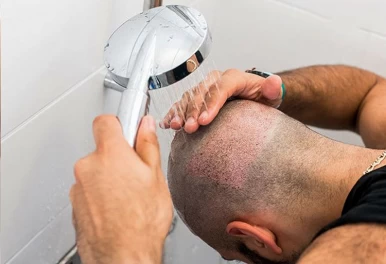
The first couple of weeks after hair transplant surgery are the hardest. Whether you get FUE or FUT, you should make lifestyle changes to achieve greater results and heal faster. One way to ensure proper healing and maximize the success of the hair transplant procedure is to wash the head properly after this operation. Read along to learn about aftercare tips for showering after a hair transplant, hot shower after a hair transplant, bath after a hair transplant, normal shower after a hair transplant, and the best time for washing hair after a hair transplant.
What happens to Scalp after Hair Transplant?
A week after hair transplant surgery, the transplanted hair follicles take root, and the scabs are formed. Also, the sutures will close the cuts, and the risk of infection is very low. However, your scalp will be swollen as the bodily fluid accumulates under its skin to heal the wounds, and you probably have mild pain in the donor site.

Showering After a Hair Transplant
Patients can bathe right after a hair transplant but should keep their scalp dry. They must also keep their scalp clean during the recovery time to prevent infection, ensure proper healing, and maximize the success of the hair transplant procedure. However, they should follow some tips for showering after a hair transplant, including avoiding hot showers or any excessive water pressure on their scalp during the first week after the surgery. They should also avoid rubbing or scratching their scalp when applying shampoo after a hair transplant. Shampoo.
Shower after Hair Transplant Timeline
As mentioned, your head will be washed in the clinic after surgery. After that, wash your hair based on the following timeline.
Day 1-3
Start washing your head 48 hours after hair transplant surgery. You can also ask a technician in the clinic to do the first head wash after hair transplant and apply the necessary ointments on the donor site. During the first three days,
- Use prescribed shampoos;
- Rub your scalp with your fingertips, not nail;
- Do not use douche; instead, pour the lukewarm water on your hair with a pitcher.
- Clean the donor site with the palm of your hand;
- Do not massage or pull the grafts;
- Avoid using blow dryers. Pat the towel on your head gently to dry the grafts;
- Use a comb, but do not rub it on the scalp and roots.
Day 4-7
At this time, you should still use proper shampoos and rub your scalp with the palm of your hand or your fingertips. You can now dry your hair with a blow dryer (with the lowest temperature). Do not use hair spray and other products during the first week after hair transplant surgery.
Day 7-14
In the second week, your stitches will be removed, and you can use regular shampoos, hair products, and higher temperatures of blow dryers. However, it is recommended that you let the hair grafts rest by avoiding chemical products.
When to Wash Hair After Hair Transplant?
The first wash after a hair transplant is usually done in the clinic, where the doctor will give the necessary instructions to the patient. After a hair transplant, it is generally recommended that patients wait at least 48 hours before showering. This allows the newly transplanted hair follicles to settle and helps reduce the risk of dislodging the hair grafts.
Headwash after a hair transplant should be done carefully to ensure proper healing. Patients should follow the doctor’s guidelines on how to wash transplanted hair without causing any damage. Additionally, understanding when to wash hair normally after a hair transplant is crucial for maintaining the health and success of the hair grafts.
Steps for First Wash after Hair Transplant
- Pour lukewarm water from a cup or pitcher on your head to wet the hair strands.
- Apply the prescribed shampoo and gently massage the scalp with your fingertips.
- Rinse your hair and massage the donor site with the palm of your hand in circulation motion.
- Pat dry your hair with a towel, or let it dry naturally. Remember that sun exposure hurts the follicles and causes scarring.
- Comb your hair gently without rubbing it on the roots.
Tips to Consider for Hair Wash After Hair Transplant
To wash the head after hair transplantation, patients must follow the following points:
- Start washing from day two - to three after hair transplantation;
- Do not put any pressure on the scalp and hair;
- Avoid direct water flow on the scalp. For this purpose, use a bowl of water or spray;
- Mix the shampoo with lukewarm water and gently apply on the head;
- Be careful not to touch the scalp with the fingertips or nails, as it causes damage to the grafts and their growth;
- Preferably spray the shampoo solution with water on the head using a sponge;
- Use a hand shower or a bowl of lukewarm water to rinse the head;
- Do not go directly under the shower;
- Avoid using a hair dryer or towel to dry the transplanted hair. Preferably, let the hair dry by itself. In an emergency, use a soft paper towel to dry.
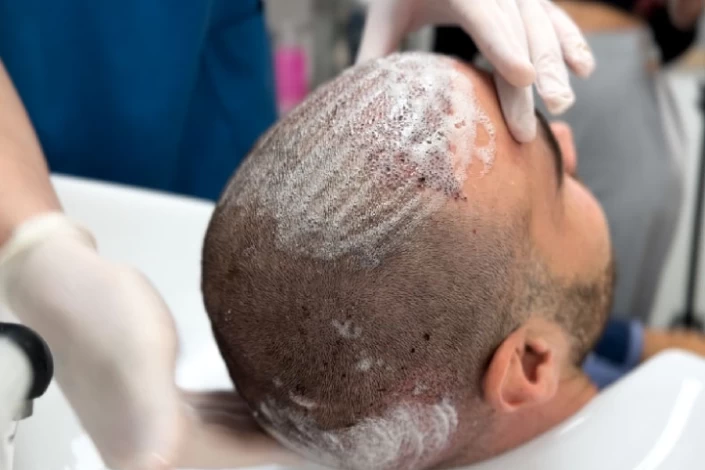
Characteristics of a Good Shampoo after a Hair Transplant
Choosing a good shampoo is one of the most important factors for washing hair after a hair transplant. The wrong shampoo can cause the hair to fall out and prevent the growth of the transplanted hair. The best shampoo after a hair transplant is a chemical-free (herbal) or baby shampoo. Patients should avoid shampoos and hair care products that contain harsh chemicals that can damage their scalp.
How to Dry Hair After a Hair Transplant?
Heat and pressure are two important factors that may damage the implanted hair grafts. Patients should let the hair dry after the transplant and avoid using a hair dryer or towel to dry the implanted hair. If they are in a rush to dry their hair, they can use a very soft paper towel and dry their hair with the lowest pressure and touch.
How Often to Wash Hair After Hair Transplant?
The first three days after a hair transplant are very important. If the procedure uses the Fut technique, the patients should not wash their hair on the first day. They should wash their hair daily for two weeks to keep the scalp clean and prevent infection.
Patients who have had a Fue hair transplant can shower after the procedure. However, direct water pressure on the scalp should be avoided.
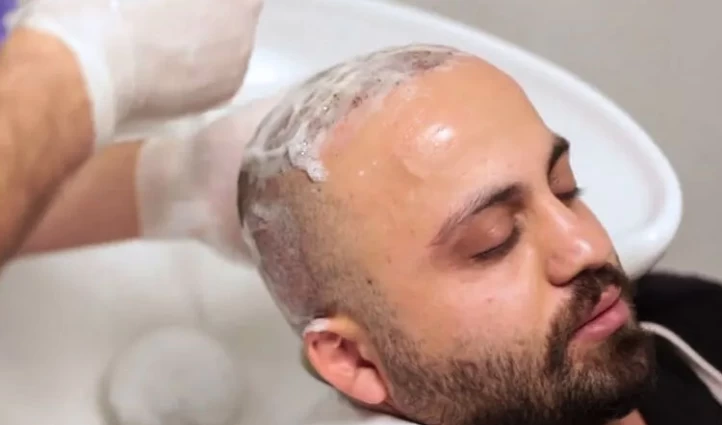
Can You Massage Your Scalp When Washing Your Hair After Hair Transplant?
It is generally recommended that patients avoid massaging or rubbing their scalp when washing hair for ten days after a hair transplant. Gentle fingertip massage is usually acceptable, but excessive pressure or rubbing can potentially dislodge the newly transplanted hair follicles.
How to Deal with Post-Transplant Itchiness?
Post-transplant itchiness is a common side effect of hair transplantation and can be uncomfortable. Here are some tips to deal with post-transplant itchiness:
- Avoid scratching;
- Use a gentle shampoo;
- Rinse thoroughly;
- Apply cold compresses;
- Use prescribed medications;
- Avoid heat and direct sunlight;
- Moisturize the scalp with a gentle, non-greasy moisturizer or aloe vera ;
- Avoid tight headwear;
- Keep the scalp clean.
When to Shower Normally After Hair Transplant?
Patients can begin washing their hair normally 14 days after a hair transplant. They can also wash their hair more than once a day if needed, but be careful that hot showers are prohibited after a hair transplant, as they can cause bleeding and ruin the grafts.
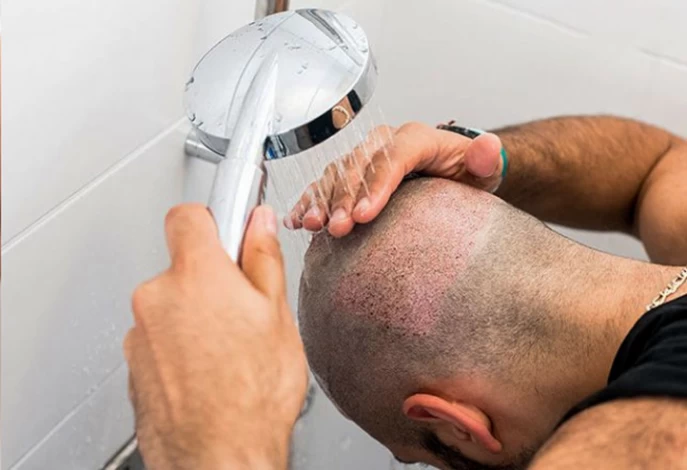
What to Do If You See Hair Loss in The Shower?
It is normal to experience some shedding after a hair transplant procedure. This is known as shock loss and occurs when the transplanted hair follicles go into a resting phase before re-growing. It is a temporary phenomenon and should not cause alarm.
However, it is recommended that patients note the amount of hair loss they are experiencing. If it seems excessive or continues for an extended period, it may be a cause for concern.
In this case, patients should contact their hair transplant surgeon and inform them about the hair loss. The surgeon can evaluate the condition and determine whether it is within the normal range or if further investigation is required.
Hair Transplant in Iran
Hair transplants in Iran are a popular choice for patients seeking affordable, high-quality hair restoration procedures. The country has gained a reputation for its skilled surgeons, state-of-the-art facilities, and competitive prices.
Iranian clinics offer various hair transplant techniques, including Follicular Unit Extraction (FUE) and Follicular Unit Transplantation (FUT). FUE is the most commonly performed method.
If you have any questions or concerns about performing a hair transplant in Iran, it is important to consult with a healthcare professional for personalized advice.
Contact our team at Raadina Health. We will evaluate your case, discuss your expectations, and determine the most suitable technique for you!
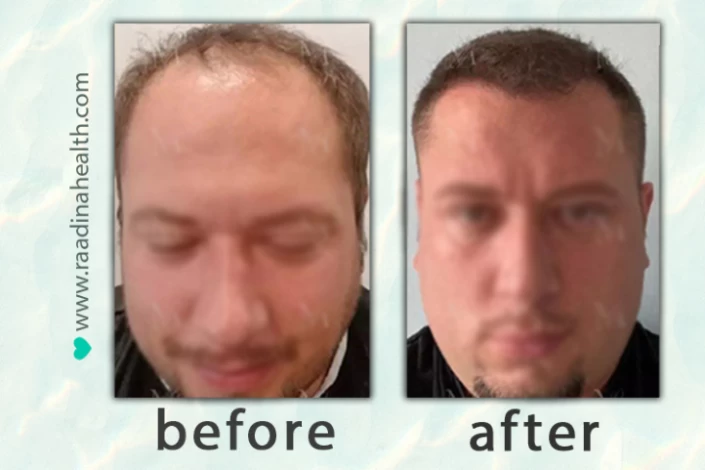
FAQs about Showering after Hair Transplant
When Can I Wash My Hair Normally after Hair Transplant?
You can wash your hair normally two weeks after hair transplant surgery.
When Can I Rub my Head after a Hair Transplant?
Do not rub your head for ten days after hair restoration, as you may hurt the stitches and transplanted follicles or remove the scabs and cause bleeding.
When can I shower with hot water after a hair transplant?
Refrain from washing your head with hot water, using the hot tub, and entering the sauna for four weeks after the surgery.
Can I wash my hair with cold water after a hair transplant?
After hair restoration surgery, you shouldn’t wash your head with hot or cold water. Use lukewarm water to clean your head and face until your wounds completely heal. Also, the water pressure pressure should be moderate so the hair follicles are not hurt.
Is swimming allowed after a hair transplant?
Swimming should be avoided for at least 3–4 weeks after a hair transplant. Chlorine in pools and bacteria in seawater may irritate the scalp and affect graft healing. Always wait until your surgeon gives you clearance.
How do I safely remove scabs after a hair transplant?
Scabs usually fall off naturally within 7–10 days. To help the process, gently wash your scalp with lukewarm water and mild shampoo, massaging softly with your fingertips after the first week. Never scratch or pick them off.
When can I wash my hair normally after a hair transplant?
You can usually return to your normal hair-washing routine after 2–3 weeks, once the grafts are fully secure. In the first days, only gentle rinsing with baby shampoo is recommended.
How soon can I wash and style my hair after transplantation?
Gentle washing is allowed within a few days, but styling with gels, sprays, or heat tools should be avoided for at least a month. Hair dryers on cool settings may be used after 3 weeks, but check with your doctor first.

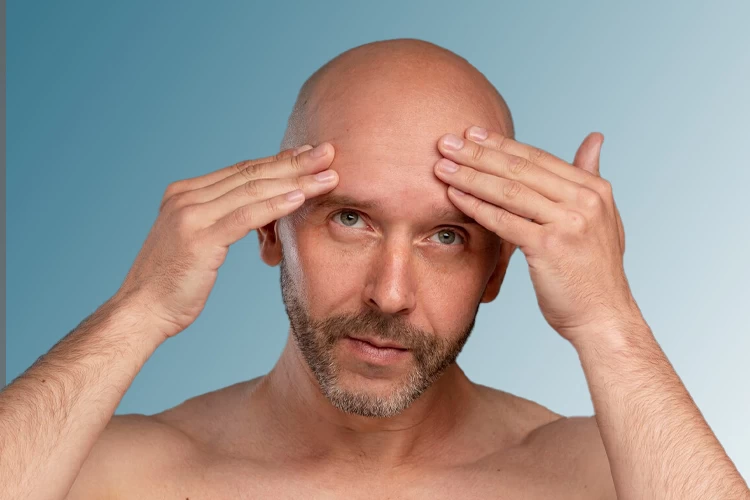
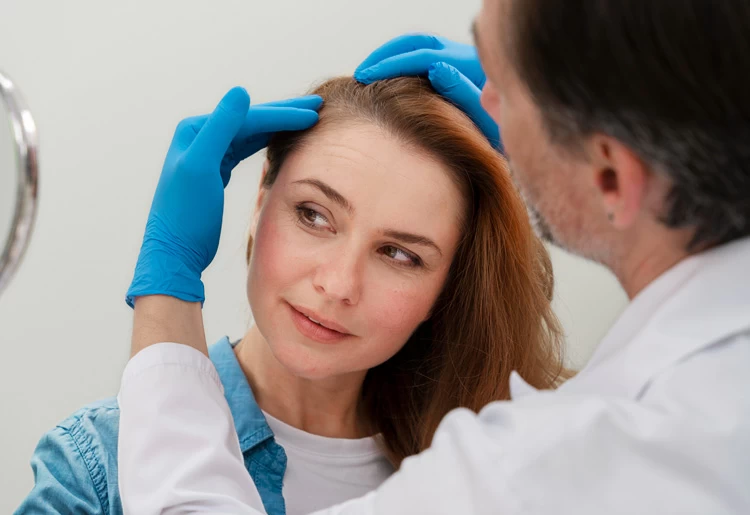

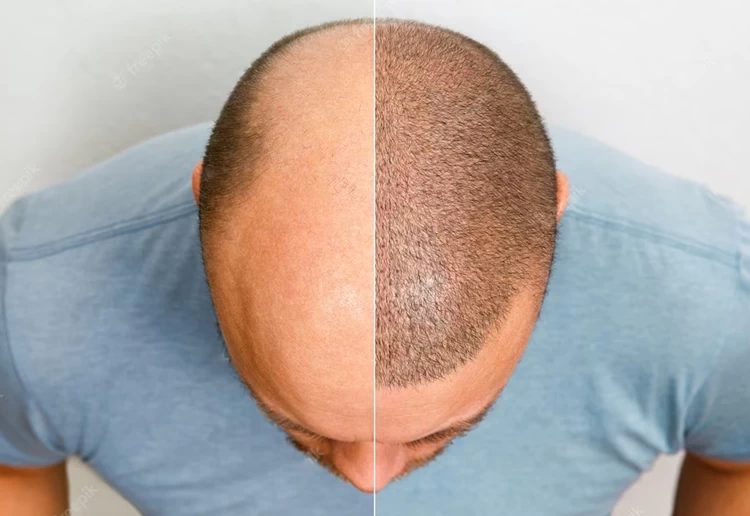
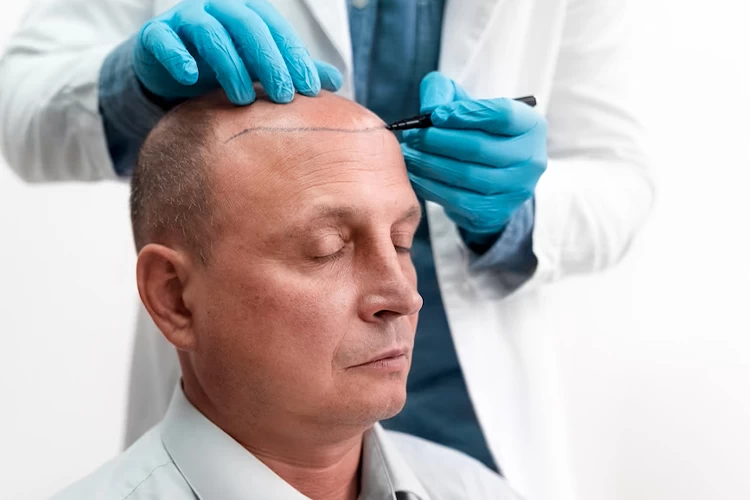
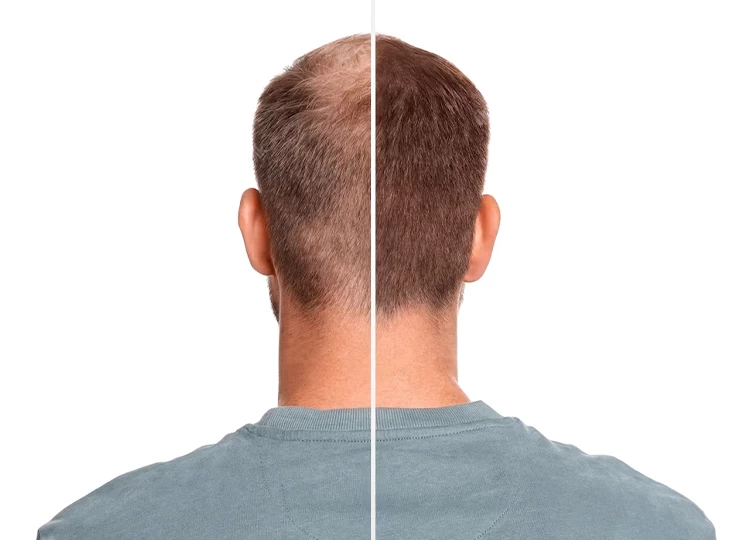
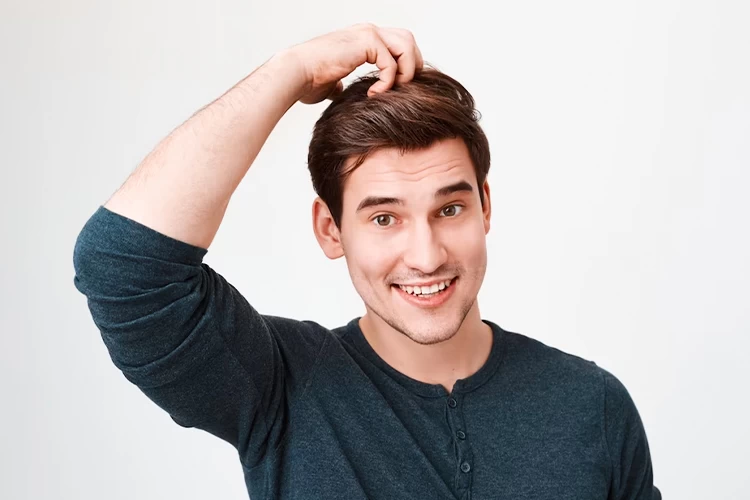

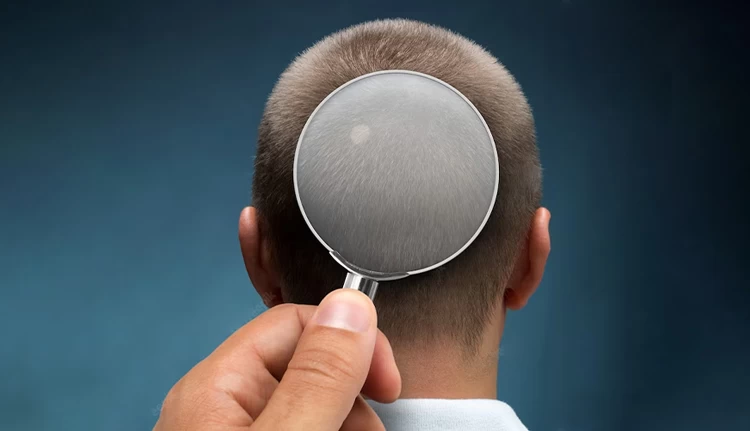
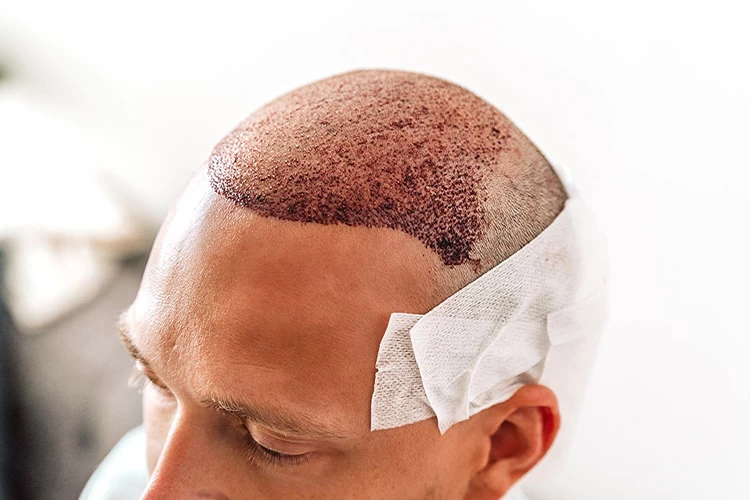
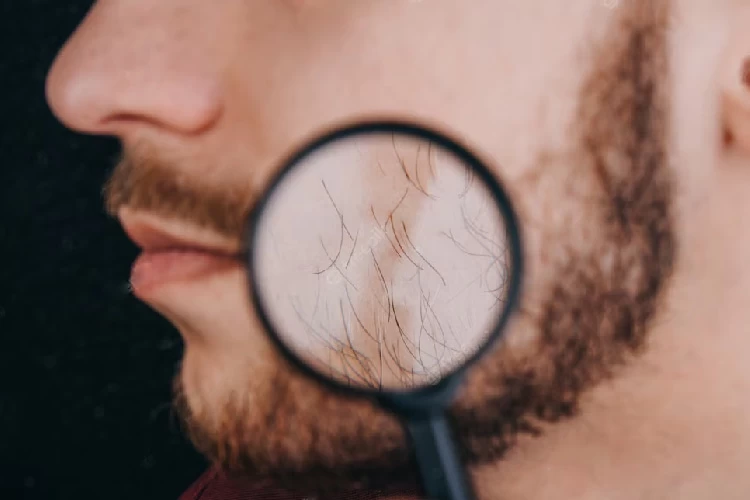
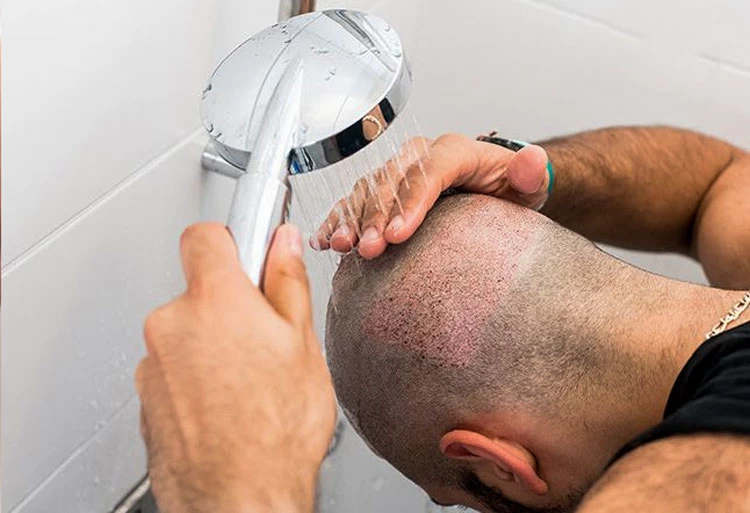
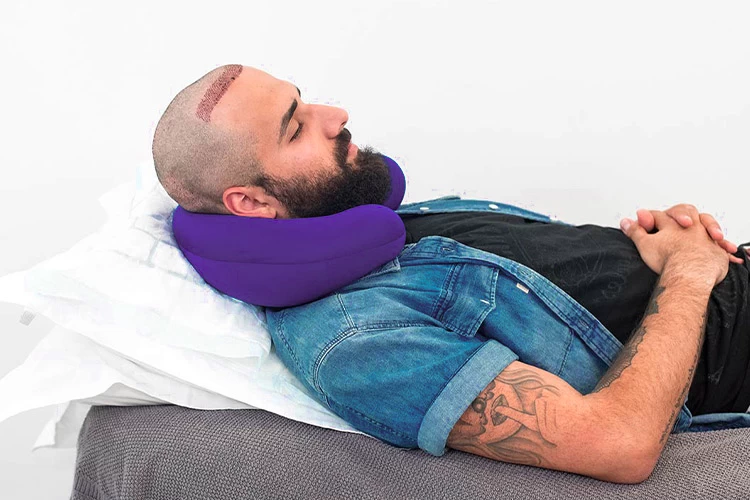
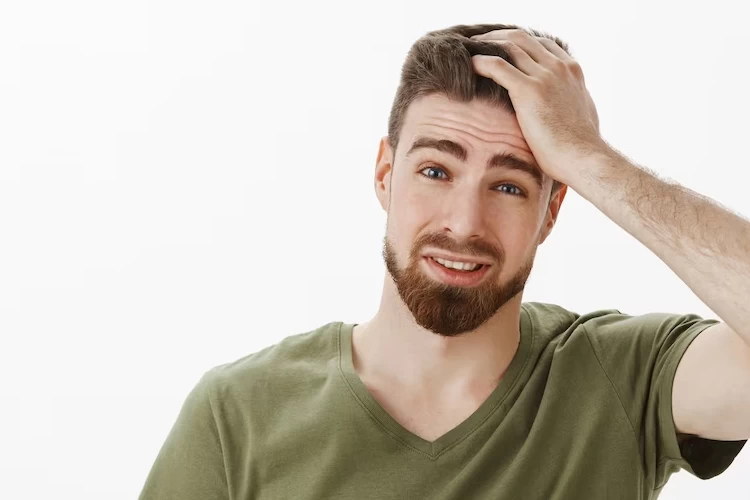
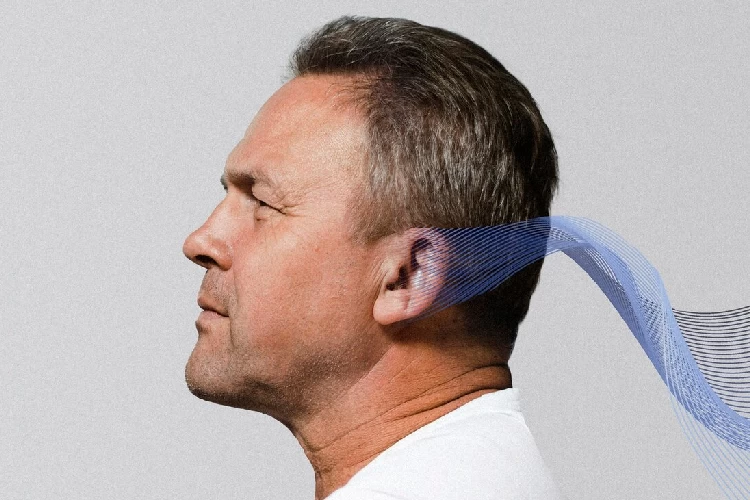

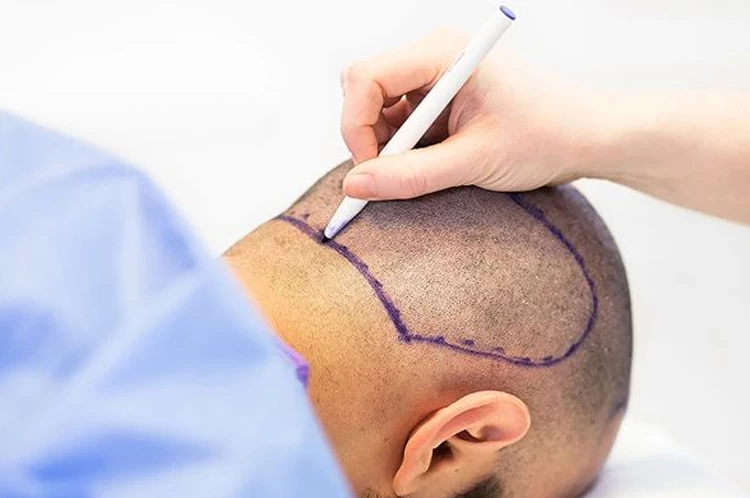
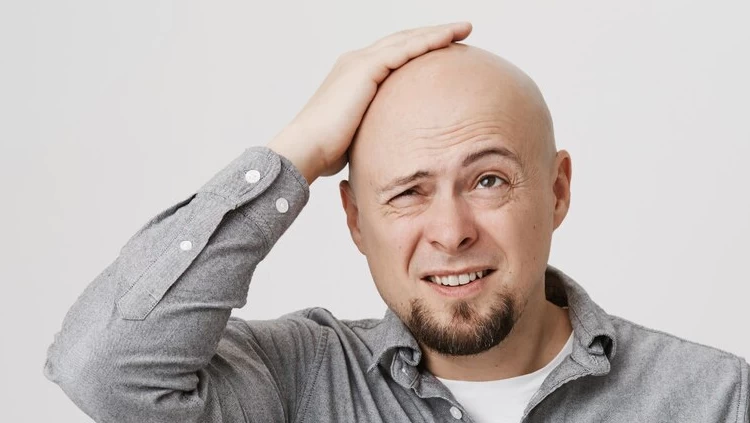
No reviews
Your comment